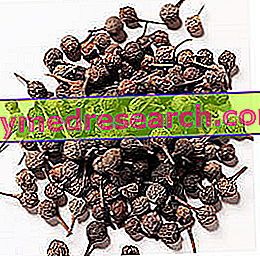Spicy Spice
" It is surprising that the use of pepper has become so fashionable, seeing that in the other substances we use it is the sweetness or their appearance that has attracted our attention. Pepper has nothing in itself that can implore a recommendation like other fruits, having a certain spiciness as its only quality. »

The etymology of the term refers to the ancient Sanskrit "pappali", to become "pipor" in archaic English and in "piper" in Latin; in botany it is known as Piper nigrum, belonging to the Piperaceae family.
Drying
Black pepper indicates the semi-ripe fruit of Piper nigrum ; if the black pepper is decorticated, it is called white pepper. Also the green pepper comes from the same plant, and differs from the white and the black one due to the different stage of maturation of the drupe (fruit).
Black pepper is the most spicy in its category, thanks to the consistent amount of piperine contained.
Before starting the drying process, the fruits are quickly scalded in hot water: during drying, the phase in which the peppercorns are placed in special dryers for a few days, the pulp of the fruit breaks, consequently the grain is it blackens faster, until it takes on the typical nigra color.
Mixing black pepper with white pepper, which is characterized by a less spicy flavor with a particular sweet and sour note, gray pepper is obtained.
spiciness
In ancient times, the properties of black pepper were exploited as "flavor modulators": to improve the taste of certain alcoholic beverages, such as wine and beer, pepper was added; black pepper was then mixed with food and drink due to its antibacterial properties. In this regard, it is inaccurate to say that pepper can boast therapeutic properties when added to foods: piperine, which gives the pepper its spiciness, has antibacterial properties, but the quantity needed for the therapeutic effect should be much higher than that normally added to enrich foods.
Therapeutic properties
It is good to remember that pepper, being an oriental spice, was used for both culinary and curative purposes: for example, as early as the fifth century, black pepper was described in the Syrian Book of Medicine to alleviate certain disorders such as diarrhea, earache, heart disease, hernias, insect bites, disorders of the liver, insomnia, oral abscesses, indigestion and stomach pain. Indeed, in some cases it was advisable to apply black pepper directly in the eyes to alleviate the visual disturbance: obviously, these properties attributed to pepper do not have a medical basis and many meanings are wrong. In fact, the irritating power of the pepper is known: the application to the eye level would therefore cause serious problems to the eye. The custom of taking pepper for stomach ailments was also incorrect: the irritation caused by piperine tends to further compromise the gastric situation, stimulating the secretion of acid juices.
As mentioned, piperine is the substance that gives the drug spiciness; it should not be confused with chilli pepper capsaicin, a hundred times more spicy.
Essential oil of black pepper
The essential oil of black pepper has a burning and spicy nature; in the pulp there are other important active ingredients, such as terpenes, linalol, caryophyllene, limonene and pinene, which contribute to the strong character of black pepper. These substances are present only in very small percentages in white pepper, being devoid of the pulp.
It is therefore understandable how the saying "one person all pepper" refers to a lively and dynamic temperament; on the other hand, a person "neither salt nor pepper" hides a meaningless personality.



